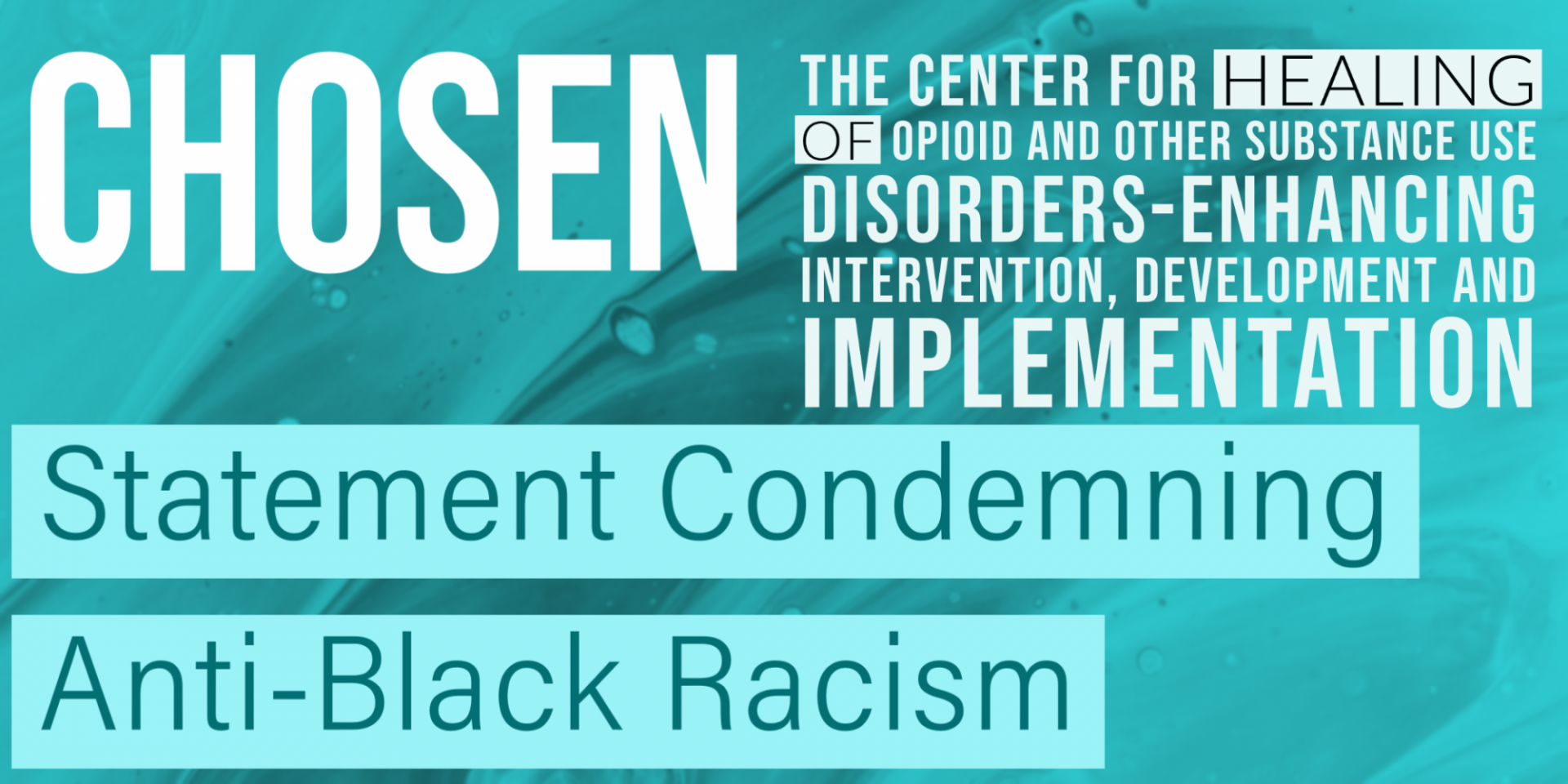CHOSEN lays out a plan for diversity, equity, inclusion, and justice.

CHOSEN Condemns Anti-Black Racism
Earlier this year, Columbia announced the opening of a new multi-disciplinary center, Columbia Center for Healing of Opioid and Other Substance Use Disorders—Enhancing Intervention Development and Implementation (CHOSEN). CHOSEN was founded to tackle the overdose epidemic within the United States and globally.
SIG's Director, Dr. Nabila El-Bassel, one of the four directors of CHOSEN, is sharing the following statement from CHOSEN leadership condemning anti-Black racism and promoting equity and social justice.
Statement from CHOSEN Leadership on Anti-Black Racism and Diversity, Equity, Inclusion, and Justice
At the Columbia Center for Healing of Opioid and Other Substance Use Disorders—Enhancing Intervention Development and Implementation (CHOSEN), we condemn anti-Black racism. We are committed to taking action to redress racism and the underlying social injustices that continue to plague our society with a particular focus on people who use drugs, people with opioid use disorders, and those with mental health problems. Systemic racism plays a major role in the huge disparities in access to treatment and care faced by people of color. Black individuals have less access to drug treatment services. At the same, racialized drug laws and policing have resulted in Black individuals being much more likely to be arrested and incarcerated for drug-related crimes than white individuals even though they have comparable rates of drug use. There is an urgent need to redress these glaring racial inequities in access to substance use prevention, treatment and care with data-driven policies, community-engaged programs and culturally tailored evidence-based practices.
We will address racial inequities by adhering to diversity, equity and inclusion best practices in the way we conduct our academic clinical research, community engagement of stakeholders, implementation science, training, educational activities, and in the way we prepare our next generation of social scientists, physicians, and student affiliates involved with CHOSEN. This nation has a long history of racism and oppression, especially against Black people, from slavery and public lynchings, to racial profiling, mass incarceration, employment discrimination, and denial of health care services. Structural racism limits access to services and treatment for people of color. Institutional, cultural, and interpersonal racism profoundly affects Black people with substance use disorders, as they are often stigmatized by health care systems and, at times, by the providers who are entrusted with their care. They face prejudice, discrimination, and denial of adequate or compassionate treatment. CHOSEN has a commitment to taking action to tackling systemic and cultural racism and other forms of inequalities as part of the Center’s mission, research, training, and education. Each of us at the Center must do more in order to end the injustices that the people we study face. We also need to do more to improve diversity, equity and inclusion in addiction and harm reduction research. Accordingly, we have committed to taking the following actions.
- Promoting multi-disciplinary research, scientific working groups, seminars, programs on capacity building, and dissemination of evidence-based practice and policies dedicated to addressing structural and cultural barriers related to racism in addiction treatment and harm reduction research.
- Creating a workplace environment that embraces diversity, equity, and inclusion in leadership of the center and hiring, training and promoting of staff and salary equity by race and speaking out against all forms of racism.
- Developing a stakeholder-driven detailed plan of action to achieve equity goals of amplifying voices of Black, indigenous, and other people of color; tackling racial bias to improve and diversify our pipeline of future scientists and leaders, and commit resources toward this end.
- Monitoring our progress toward these goals with an annual diversity, equity, and inclusion climate assessment with key stakeholders, staff and leadership of the Center.
Nabila El-Bassel, University Professor, Wilma & Albert Musher Professor of Social Work, Director, Global Health Research Center of Central Asia, Director, Social Intervention Group, CSSW
Frances R. Levin, Kennedy-Leavy Professor of Psychiatry, CUIMC, Chief Division on Substance Use Disorders, NYSPI
Edwards V. Nunes, Chairman, NYSPI-IRB Professor of Psychiatry, CUIMC
Muredach P. Reilly, Professor of Medicine, Director of the Irving Institute CTSA, and Associate Dean for Clinical & Translational Research, CUIMC
Louisa Gilbert, Associate Professor of Social Work, Co-Director Social Intervention Group, CSSW
Harold Pincus, Professor of Psychiatry (in Health Policy and Management) and Vice Chair Department of Psychiatry, Co-Director Irving Institute for Clinical and Translational Research
Sandra Comer, Professor of Neurobiology (in Psychiatry), CUIMC
Elwin Wu, Professor of Social Work, Co-Director, Social Intervention Group, CSSW
Aimee Campbell, Associate Professor of Clinical Psychiatric Social Work, CUIMC
Tim Hunt, Associate Research Scientist, Associate Director Social Intervention Group
